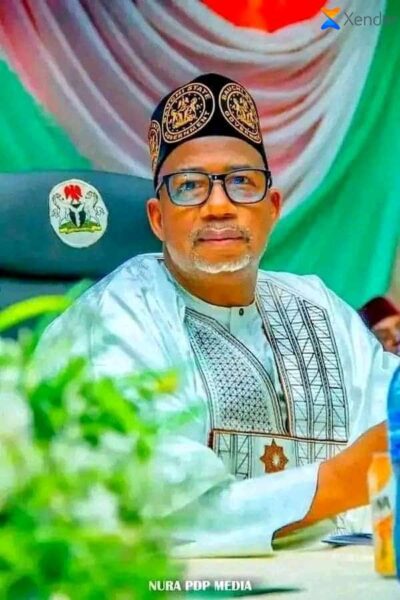Breaking News
PDP 2027: Southern Presidential Hopefuls Emerge as Northern Running Mates Take Shape
This strategic move has thrust three southern figures into the spotlight: former President Goodluck Jonathan, former Anambra State Governor and 2023 Labour Party candidate Peter Obi, and Oyo State Governor Seyi Makinde. Each offers unique advantages, challenges, and distinct pathways to clinching the party’s nomination. Meanwhile, attention is also turning northward as potential vice-presidential candidates begin to emerge.

The People’s Democratic Party (PDP) has taken a decisive turn in the build-up to the 2027 elections by zoning its presidential ticket to the South, effectively reshaping the internal dynamics of the race and sidelining long-dominant northern aspirants.
This strategic move has thrust three southern figures into the spotlight: former President Goodluck Jonathan, former Anambra State Governor and 2023 Labour Party candidate Peter Obi, and Oyo State Governor Seyi Makinde. Each offers unique advantages, challenges, and distinct pathways to clinching the party’s nomination. Meanwhile, attention is also turning northward as potential vice-presidential candidates begin to emerge.
Goodluck Jonathan: The Consensus Choice with a Divisive Past
Jonathan, who led Nigeria from 2010 to 2015, remains a respected figure within the PDP and beyond. His graceful concession in the 2015 election elevated Nigeria’s democratic image and earned him global admiration. Internally, his neutral stance in party affairs has preserved his standing as a potential unifying candidate.
However, critics argue that his age and record in office — marked by issues of insecurity and corruption — may hinder his appeal, especially among younger voters. His 2015 loss revealed a lack of strong northern support, a problem that could resurface if he contests again.
Jonathan’s route to the ticket is not driven by grassroots momentum, but rather by elite consensus — particularly among party governors and powerbrokers who value stability.
Peter Obi: The Outsider Poised for a Comeback
Peter Obi, now a national figure after his surprising performance in the 2023 election under the Labour Party, brings unmatched grassroots energy. His frugal image and credibility birthed the influential ‘Obidient’ movement, galvanising youth, urban professionals, and Nigerians in the diaspora.
Though he left the PDP in 2022, Obi’s return could revitalize the party. However, his candidacy may stir tensions among party insiders who still see his defection as betrayal. Moreover, Obi’s inconsistent northern support remains a strategic vulnerability.
Despite these hurdles, Obi’s national electability makes him the most potent challenger to the APC — if the PDP can reconcile internal divisions.
Seyi Makinde: The Establishment’s Loyal Bet
Governor Seyi Makinde is viewed as the PDP’s candidate for continuity and institutional discipline. His re-election in APC-dominated South-West and reputation as a pragmatic technocrat have strengthened his credibility within party circles.
At 57, Makinde symbolizes generational renewal, and the choice of Ibadan as the convention venue hints at strong backing for his bid. However, he lacks national recognition compared to Jonathan and Obi and faces internal rivalry, particularly from Nyesom Wike’s influential bloc.
Makinde’s challenge lies in translating regional strength into national relevance.
Gbenga Olawepo-Hashim: The Symbol of Steadfast Loyalty
Though not a top-tier contender, Gbenga Olawepo-Hashim represents ideological consistency and loyalty. His longstanding commitment to the PDP and principled posture make him a trusted figure in internal negotiations.
While unlikely to clinch the presidential ticket, Olawepo-Hashim’s presence may shape alliances and bring symbolic balance to the eventual ticket.
Northern Running Mate Options Take Shape
With the PDP’s presidential slot now reserved for the South, the vice-presidential candidate will almost certainly come from the North. The choice of running mate could determine whether the ticket unites the party or exacerbates divisions.
- For Jonathan, a northern Muslim with strong institutional ties is essential. Bauchi State Governor Bala Mohammed, Chairman of the PDP Governors’ Forum, stands out for his loyalty and national appeal. Senator Ibrahim Dankwambo, former Gombe governor, is also seen as a credible, technocratic choice.
- For Obi, the calculus is more delicate. His base among youth and urbanites needs a northern counterpart who appeals to rural and core PDP constituencies. Bala Mohammed remains a strong option, especially after publicly recognising Obi’s political value. Aminu Tambuwal, despite links to other coalitions, could also bring credibility and northern clout if he recommits to the PDP.
- For Makinde, a partnership with Bala Mohammed or Dankwambo would signal youth, competence, and geographical balance. A Makinde–Dankwambo ticket, in particular, could embody a younger, reformist generation seeking to challenge the APC establishment.
Interestingly, Olawepo-Hashim, though from the North-Central, may be considered in unconventional scenarios — highlighting loyalty and internal stability over strict geographic zoning.
Comparative Analysis
- Jonathan offers elite consensus but risks being seen as outdated.
- Obi presents national appeal and energy but may alienate party insiders.
- Makinde reflects loyalty and institutional continuity but lacks wide recognition.
- Olawepo-Hashim is unlikely to be a leading contender but represents values that the party increasingly craves.
Conclusion
By zoning its 2027 presidential ticket to the South, the PDP has narrowed its field but heightened the stakes. Each leading aspirant — Jonathan, Obi, and Makinde — carries both promise and political baggage. The choice of a northern running mate will sharpen their contrasts and may determine whether the party presents a unified, compelling challenge to the ruling APC.
With unity, electability, and loyalty all in play, the PDP’s decision in the months ahead could shape its identity — and future — as a national political force.









